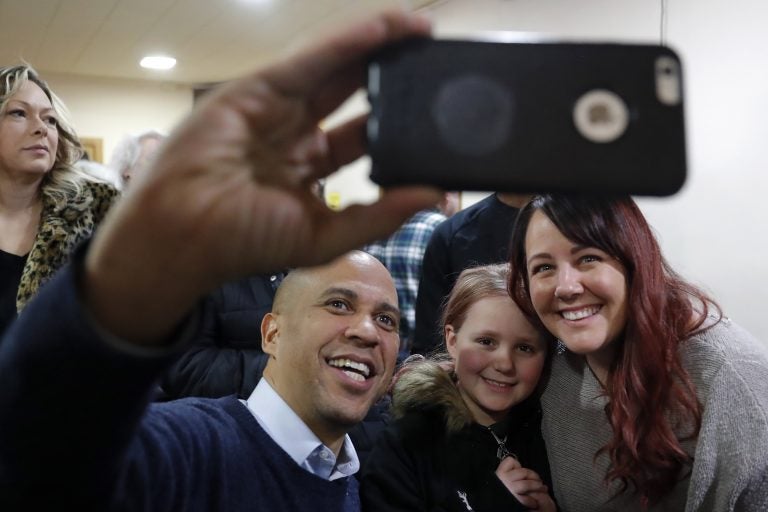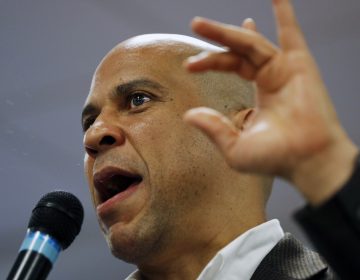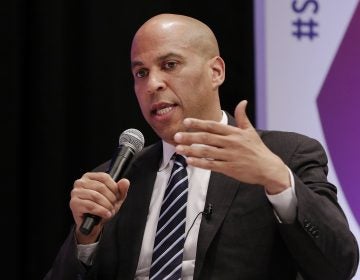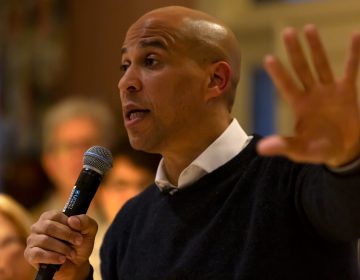Booker taking 2020 campaign, social-justice message to Iowa
Sen. Cory Booker took his message of social justice to Iowa, where he visited with residents and black leaders Friday on his first trip as a Democratic presidential candidate.

U.S. Sen. Cory Booker, D-N.J., poses for a photo with Alyssa Benson, of Mason City, Iowa, (right), and her daughter Jersey, (center), during a meet and greet with local residents at the First Congregational United Church of Christ, Friday, Feb. 8, 2019, in Mason City, Iowa. (Charlie Neibergall/AP Photo)
New Jersey Sen. Cory Booker took his campaign message of social justice to Iowa, where he visited with residents and black leaders Friday on his first trip as a Democratic presidential candidate to the early 2020 caucus state.
Booker opened his first day of campaigning in Iowa using the rhetoric reminiscent of the civil rights movement to distinguish himself early in the race. And although Iowa is a vastly white state, Booker’s is a sentiment that echoes within the state’s Democratic base.
In a crowded church basement in Mason City, Booker likened denying health care coverage to denying civil rights.
“You cannot have life, liberty and the pursuit of happiness if you don’t have health care,” he told an overwhelmingly white audience of about 100 who turned out despite sub-zero temperatures. “That’s not justice.”

Later, in a racially mixed crowd in Waterloo, Booker bemoaned a criminal justice system that disproportionately punishes racial minorities and “ultimately makes us a country that has a cancer on our soul.”
Race is shaping up to be central to the Democratic presidential campaign. Democratic prospects have called President Donald Trump’s portrayal of immigrants racist and condemned his reaction to a deadly 2017 demonstration in Virginia as being sympathetic toward white supremacists.
Booker, who is African-American, is starting his campaign for the Iowa caucuses by framing the election in terms of a movement, like those for civil and voting rights more than a half century ago.
It’s a theme that appeals to Nancy Bobo, a white Des Moines Democrat who likes Booker.
“I think more and more people are seeing that social justice doesn’t just apply to race,” said Bobo, who was among the first supporters of Democrat Barack Obama in Iowa in 2007. “When I think of social justice, I think of all the different laws and structures that impede opportunities for people for a whole range of reasons.”
Every Democratic presidential hopeful has called for Virginia Gov. Ralph Northam’s resignation after disclosure last week of a photo in the Democrat’s medical school yearbook under Northam’s name featuring a person in blackface and another wearing a Ku Klux Klan robe and hood.
In Waterloo, Booker became the first presidential candidate this year to visit Black Hawk County, where the black population — at 9 percent — is more than twice that of Iowa overall.
Booker, a former mayor of Newark, held a public panel discussion in Waterloo focusing mainly on issues facing the black community.
Throughout his events, Booker sprinkled in references to civil rights figure John Lewis, a longtime Democratic congressman from Georgia.
“I want to try to rekindle in all of us the idea that this has got to be a moment in this nation that is more than just about an election,” he told the audience in Mason City. “This is about the cause of our country.”
Booker’s campaign announcement last week invoked the legacy of the civil rights movement. “The history of our nation is defined by collective action; by interwoven destinies of slaves and abolitionists, of those born here and those who chose America as home; of those who took up arms to defend our country, and those who linked arms to challenge and change it,” he said in the kickoff video.
Booker could appeal to that segment of Iowa voters who sent Democrat Tom Harkin, an outspoken advocate for worker and civil rights, to the Senate for 30 years until his retirement in 2014.
Obama, who would become the nation’s first black president, won Iowa’s 2008 Democratic presidential caucuses by drawing activists to rhetoric heavily influenced by the civil rights movement and its unifying call for equal opportunity.
Booker has not yet made an impression on Sandy Cronbaugh, who is white and was moved to support Obama in 2008, just as she was to support the civil rights movement more than 40 years earlier.
“Barack Obama made you feel like you were changing the country by working in your community,” said Cronbaugh, an art gallery owner from rural eastern Iowa. “I haven’t gotten that sense from Cory Booker so far.”
WHYY is your source for fact-based, in-depth journalism and information. As a nonprofit organization, we rely on financial support from readers like you. Please give today.




